If you want to get the most out of your workouts, few things are more important than proper recovery. A hard day on two wheels is useless if you don’t give your body the tools it needs to recover and produce the necessary adaptations. If you give your body the chance to recover as it deserves, it will arrive at your next training session or race in even better condition.
Among the many recovery strategies we know, recovery drinks for cyclists are one of the most widespread. In this article we review why they are important and what to consider when consuming them.
Nutrition and post-exercise recovery
You may have heard of the three “R’s” of recovery associated with post-exercise nutrition:
- Replenishment: carbohydrate consumption replenishes glycogen stores, our body’s main fuel.
- Repair and adaptation: thanks to protein intake, nutrition facilitates the process the body goes through to repair damaged muscles and respond to the stress of training.
- Rehydration: allows us to replenish the fluid lost during exercise due to sweating.
These three processes associated with recovery can be achieved through a rich and varied meal. However, recovery drinks for cyclists are a convenient, fast and efficient way to refuel after a demanding workout or after a competition in which we have pushed our body to the limit.
Why are recovery drinks for cyclists important?
By consuming nutrients immediately after exercise (something that is often only possible with recovery drinks for cyclists), we are giving the body the opportunity to replenish its glycogen stores and begin the process of repairing muscle damage, as well as returning it to a state of adequate hydration.
Glycogen is used as fuel during aerobic exercise and can be depleted during training, so if it is not replenished, we may run the risk of feeling “empty” during the next session. In the case of proteins, they are necessary to complete muscle protein synthesis and prevent muscle protein degradation.
For years it has been advocated that there is a limited amount of time in which athletes can effectively replenish their glycogen levels. That window of time is known as the “anabolic window” and has traditionally been considered to be between 30 and 45 minutes post-workout. However, more recent research suggests that this anabolic window may be wider, lasting up to five-six hours.

In order to take advantage of this more optimal period for recovery, the advice is to consume between 1-1.5 grams of carbohydrate per kilogram of body weight, per hour, within those two hours following the completion of a workout or competition. In order to replenish glycogen levels, it is also suggested to consume the same measure (1-1.5 g of carbohydrates per kilogram of body weight) every fifteen to thirty minutes for the next four to six hours.
The consumption of carbohydrates and proteins safeguards lean muscle mass and tunes up our body for the upcoming challenges. However, this constant recharging process is much slower and more active than that involved in a recovery drink for cyclists.
When and how to take a recovery drink?
It is not necessary to take the recovery drink right at the end of a demanding training session. But you should know that the sooner you consume it, the sooner your glycogen stores will be replenished and the sooner the recovery process will begin: when we move from an active state to a recovery state, the body changes from a sympathetic state to a resting parasympathetic state. Drinking a recovery drink while you cool down and relax means sending the signal to the body that it is time to rest, digest and repair.
As for the type of recovery drink for cyclists, it should be noted that there is no magic recipe. You can find a wide range of products on the market with very different compositions, but it is true that research has suggested in recent years that the ideal ratios range from 3:1 to 4:1 carbohydrate to protein. While carbohydrates resynthesize glycogen, protein improves muscle synthesis.
At BKOOL, we keep working to make your simulations more and more real, try it FREE for 30 days!
 Go to BKOOL
Go to BKOOL





